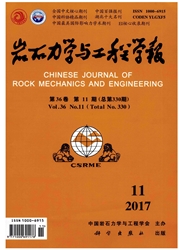

 中文摘要:
中文摘要:
采用MTS815.03电液伺服岩石试验系统,研究了深圳罗湖建成区F8断裂带大理岩在常温(20℃)至800℃高温下和在100℃~700℃循环高温下(8~9次循环)的应力-应变特性;系统地分析比较了高温和循环高温作用对大理岩的刚度、峰值强度及变形特性等的影响。试验结果表明:温度升高,岩石弹性模量降低,强度降低,出现峰值强度时的应变增加;当温度低于400℃的试样宏观上体现出脆性破坏的特征,而加温高于400℃的试样则渐渐体现出了延性破坏特征,峰值强度渐渐变的不明显。对两种试验比较可知:同温下,在循环加高温作用下试样的弹性模量、峰值强度等比只加一次高温要低,而且当加温温度越高时。峰值强度降低越明显。出现延性破坏特征也越明显。
 英文摘要:
英文摘要:
The stress-strain behaviors of marble taken from F8 fault-age zone of Luohu Jiancheng district in Shenzhen under the action of temperature from normal temperature(20 ℃) to high temperature of 800℃ and cycle temperature of 100℃ to 700 ℃ (repeated 8~9 times) have been investigated by hydraulic pressure servo rigidity rock mechanics experiment system MTS815.03. Influences of the high temperature and high circle temperature on peak strength, post-peak characteristics, deformation characteristics are analyzed and compared systematically. It is shown that the elastic modulus and strength decrease when the samples suffer high temperature, at the same time the strain increases when the peak strength appears: the sample which suffers temperature lower than 400 ℃ generally have the characteristics of brittle failure and the sample which suffers temperature higher than 400 ℃ have the characteristics of plastic collapse, and gradually the peak strength appears unclearly. Comparing the two kinds of experimentation, a conclusion can be drawn that the marble peak strength and elastic modulus under the action of circle temperature are lower than those under the action of corresponding temperature one time and the higher the temperature is, the more obviously the strength decrease and the characteristics of plastic collapse appears.
 同期刊论文项目
同期刊论文项目
 同项目期刊论文
同项目期刊论文
 期刊信息
期刊信息
